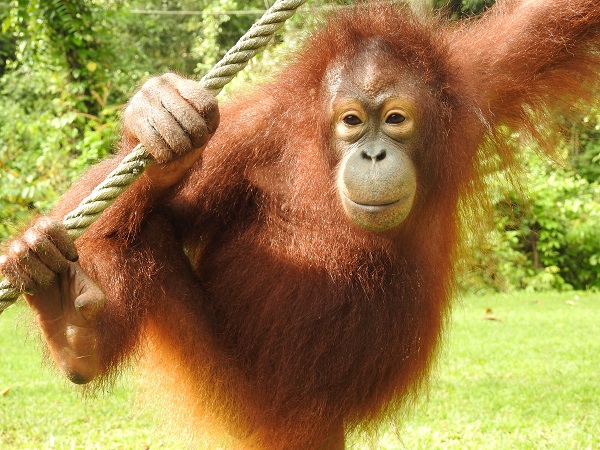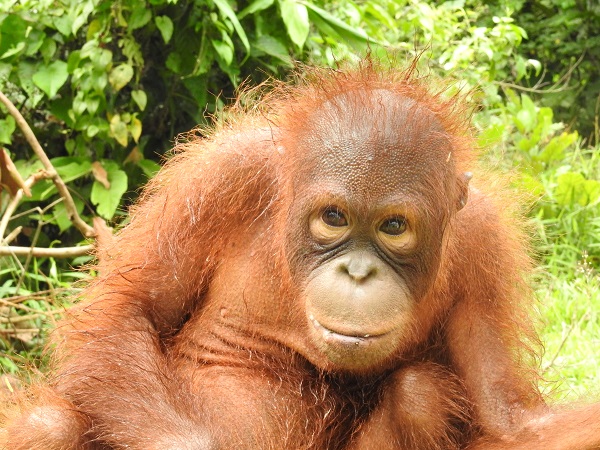The last update we received from Orangutan Appeal UK about Chikita and Gelison‘s rehabilitation journey was back in December last year. We have been adopting them since December 2014. So we’re incredibly excited to share with you the latest news about two of our adorable adopted orangutans’ progress at the Sepilok Orang Utan Rehabilitation Centre. According to the updates, both juvenile orangutans have had their ups and downs at the centre, but have made good progress nonetheless.
Here are the updates from our friends at Orangutan Appeal UK:
Chikita
Sweet Chikita will be turning seven years old soon and my, how much she’s grown! She has been slow to gain confidence at the Outdoor Nursery over the last six months, but she has definitely taken her lessons more seriously lately. Her rehabilitation journey at the centre has been a steep learning curve as she still has a difficult time exploring the forest by herself. She gets anxious whenever she has an encounter with mother orangutans and their young, and makes sure to keep out of their way when they are near.
Recently, Chikita made a new friend that has helped to boost her confidence. She befriended Baby Peanut, the new addition to the Outdoor Nursery who has been a good company and encourager to her. They’ve been seen going on adventures to explore a little further into the forest together, which is something Chikita would not dare to do without a companion like Peanut. Having these kinds of interaction with other more active orangutans, she is practicing all the crucial skills she need to prepare her for a future back in the wild. So it’s wonderful that Chikita is progressing this way and building her strength, muscles as well as confidence.
However, despite Chikita’s promising progress during her lessons, she is well known for being Sepilok’s drama queen and continues to live up to her reputation! Like any 6 year old, if Chikita decides that she doesn’t want to take part in her training session she will often throw a temper tantrum and not even Peanut can persuade her to continue. More worryingly, Chikita has recently been spending some time on the ground. This behaviour is strongly discouraged as the soil in tropical areas can contain harmful bacteria which can be very dangerous for young orangutans. Due to this, Chikita recently developed a fungal infection on her hands which is a quite common problem in wet and humid areas. In the wild some orangutans have been found to rub their fur with a specific plant known to have antibacterial properties, which can help when they are poorly.
Chikita lost her mother at only 1 month old, so she had very limited time to understand how to survive in the rainforest. It is very important that she concentrates on what her carers are teaching her. The carers and training coordinators at Sepilok are dedicated to helping the young orangutans through their rehabilitation so that they can return to the forest where they belong. If Chikita continues to follow the example of her Nursery-mates, her skills should advance well. We will be watching Chikita’s progress very closely to see how she gets on!
Gelison
At 7 years old, our big boy Gelison has gained 2.5kg in the last 6 months and is getting much stronger. He been building up the vital muscles he will need for his future life in the wilderness.
Ever since he was brought to the Centre, Gelison has been known for taking everything at his own pace and he is certainly not one to be rushed. Whilst this is still true, Gelison has also recently taken to following some of the semi-wild males at Sepilok around, and they appear to be a good influence on him. His friendship with older orangutan Poogle has given Gelison the confidence to travel further into the rainforest and is an encouraging sign that he is becoming more independent. Recently Gelison ventured out to the main feeding platform in the Kabili Reserve, which surrounds the Sepilok Centre, where he joined the other wild orangutans to feast on some bananas; a well-deserved reward for his efforts!
Aside from bananas, Gelison particularly loves long green beans and papaya and is quick to make sure he gets his share of the food on offer at the Nursery. In the wild, orangutans need to forage for food for between 30 – 60% of their day and possibly more when fruit in the forest is scarce. In some regions orangutans have even been seen to eat soil as the minerals in the earth neutralize the acid from their fruit-rich diets. Although his foraging skills are generally good, Gelison’s lazy side can sometimes appear, making him reluctant to travel into the forest to eat. Wild orangutans are perfectly adapted to a life eating fruit in the trees. They have binocular vision, the same as humans, which means that both eyes face forwards and focus on the same object. This allows orangutans to judge distances well; a very useful skill when deciding whether they can reach a piece of fruit on the end of a branch! Gelison must learn to take advantage of these abilities if he is to be successful.
Though he still has quite a way to go, Gelison’s cheeky character means he is always popular. Not long ago when his carers were trying to call him in to his night-time enclosure, Gelison decided he would cause some mischief. He found a big leaf and hid underneath it thinking that his carers couldn’t see him! Despite Gelison’s antics, orangutans in the wild are actually very good at camouflaging themselves. Deep in the rainforest, the sunlight reflects off of the muddy brown forest floor creating an orangey light, meaning the orangutans are perfectly camouflaged from predators on the ground. Their hair, made from keratin, the same as the hair on our heads, is useful for a life in the forest as it protects the orangutan’s skin from moisture, parasites and the harmful UV rays of the tropical sunlight.
Gelison must try to improve his motivation and practice the skills his friends are helping him to learn, but his steady progress is a promising step in the right direction. Will the encouragement he is receiving help Gelison move closer to a life in the wild? Let’s wait and see..
(Photos courtesy of Orangutan Appeal UK)







